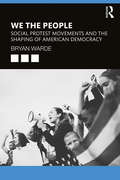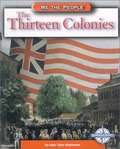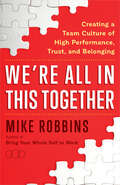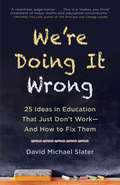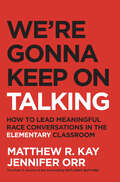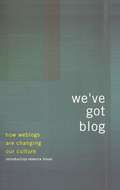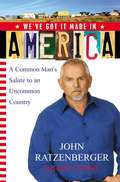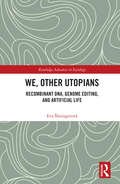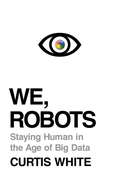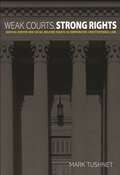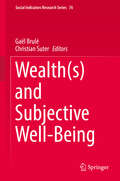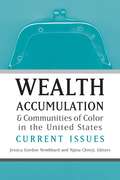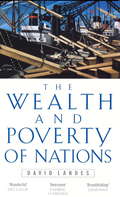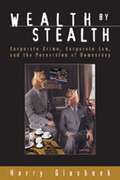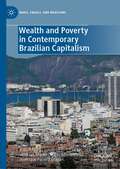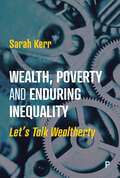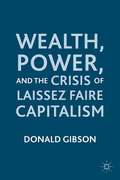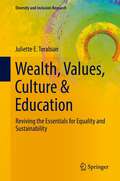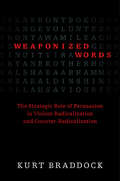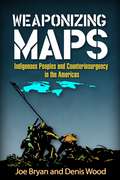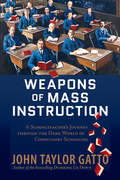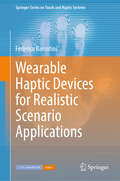- Table View
- List View
We the People: Social Protests Movements and the Shaping of American Democracy
by Bryan WardeWe the People: Social Protest Movements and the Shaping of American Democracy uses a historical and a contemporary focus to demonstrate the integral role that social protest movements play in challenging social and structural inequality along the intersecting axis of identity politics, socioeconomic status and ability, and why social protest movements should matter to social workers.The book examines how social protest movements influence progressive social policy and elucidates the social conditions that give rise to protest, how protest creates social movements, and the functions and goals of social protest movements. By exploring various theoretical perspectives, it brings both a historical and a contemporary lens to the examination of social protest movements and elucidates the critical role that social protest movements play in American democracy.With a discussion of emerging trends and the future of social protest movements, We the People explains and offers strategies for both students and social workers to develop the skills to think critically and take part in social protest movements as policy practitioners.
We the People: The Thirteen Colonies
by Marc Tyler NoblemanIntroduces the European immigrants who came to North America as explorers and settlers, their interactions with native people, and the wars that ultimately led to their independence.
We're All in This Together: Creating a Team Culture of High Performance, Trust, and Belonging
by Mike RobbinsWhat makes a great team? Author, leadership expert, and corporate consultant looks at how businesses can build trust and achieve high performance.Have you ever been on a team where the talent was strong, but the team wasn't very good? On the flip side, have you ever been on a team where not every single member was a rock star, but something about the team just worked?We've all had these types of experiences. And yet, it can be difficult to understand what makes one team successful and another one not.In this book, Mike Robbins dives deep into the ways great businesses build trust, collaborate, and operate at their peak level. As an expert in teamwork, leadership, and emotional intelligence, Mike draws on more than 20 years of experience working with top companies like Google and Microsoft, as well as his baseball career with the Kansas City Royals. And, while each team and organization have their own unique challenges, goals, and dynamics, there are some universal qualities that allow teams to truly come together and thrive.The book's core principles include fostering an environment of psychological safety, fostering inclusion and belonging, addressing and navigating conflict, and maintaining a healthy balance of high expectations and empathy. Throughout, Mike shares powerful exercises and tools he's successfully utilized in the keynote speeches, group sessions and corporate retreats that he delivers, so that you and your team can communicate more authentically, give and receive feedback with skill, and create deeper connections.We're All in This Together also features personal stories and interviews with high-level business leaders and thought leaders to provide insights into an ever-changing workplace culture. ***"For us to do our best work, have the kind of impact we truly want to have, and unlock our full potential, we can't do it alone; we must to do it together. If you and your team are willing to do what it takes, you can build and sustain an incredibly strong culture of trust and performance, and accomplish remarkable things." -Mike Robbins
We're Doing It Wrong: 25 Ideas in Education That Just Don't Work—And How to Fix Them
by David Michael SlaterAn unapologetic critique of major flaws in the American education system. David Michael Slater’s We’re Doing It Wrong is a thought-provoking dissection of the issues plaguing American public schools. Each chapter identifies a major problem in the education system, exploring its roots and repercussions. A teacher himself, Slater opens up and gives readers an insider’s perspective on topics that have been at the center of ongoing debates as well as recent hot button issues, such as: • Standardized testing • Teacher evaluation practices • Helicopter parents • Class size • Poverty’s effect on performance • Anti-bullying programs • Writing proficiency • Curriculum goals Slater explains why our current approaches simply aren’t working—for students, for teachers, for the colleges that these students may eventually attend, and for society at-large. Unafraid to ruffle a few feathers, We’re Doing It Wrong highlights defects in policy and theory, calls out administration, and questions long-held beliefs. Every chapter concludes with a suggestion for improvement, offering light at the end of the tunnel. Administrators, teachers, and concerned parents will come away with a better understanding of the current state of education and ideas for moving toward progress—for themselves and for the students they support.
We're Engaged!
by Bob Dawn DavisToday’s brides- and grooms-to-be have grown up inundated by world-class photography on the Internet, television, magazines, and social networking sites. Therefore, it’s no surprise that these savvy, image-conscious consumers have high expectations when commissioning their engagement portraits. They want unique, innovative images that make them look great and reflect their personal style as individuals and as a couple. In this book, acclaimed photographers Bob and Dawn Davis show you how to rise to that lofty goal and deliver memorable, personalized images from each session. Covering the process from start to finish, you’ll learn how to select locations, work with clients on their styling, get great poses even from camera-shy subjects, and find (or create) amazing lighting indoors and out#151;all day long. Lighting diagrams paired with each final image selection, along with supporting image variations from the same session, make it easy to learn!
We're Gonna Keep On Talking: How to Lead Meaningful Race Conversations in the Elementary Classroom
by Jennifer Orr Matthew KayWhat should conversations about race look and sound like in the elementary classroom?How do we respond authentically and truthfully to children's questions about the world?And how can we build classroom communities that encourage these meaningful conversations about race?Matthew Kay and Jennifer Orr take on these questions and more in We're Gonna Keep On Talking: How to Lead Meaningful Race Conversations in the Elementary Classroom . A companion work to Kay's Not Light, But Fire , this book focuses on the unique and powerful role discussions about race can play in the elementary classroom.Drawing its title inspiration from the lyrics of the freedom song Ain't Gonna Let Nobody Turn Me Around,- sung by hundreds of children marching against segregation in what came to be known as the Children's Crusade of 1963, We're Gonna Keep On Talking is written for teachers who are willing to match children's courage and brilliance, and who believe that a foundation in meaningful race discourse will help [children] to seek justice for themselves and their neighbors, to be kinder, [and] more thoughtful.-Writing with the humility and honest storytelling of two career classroom teachers, Matthew Kay and Jennifer Orr share: Strategies for building safe and supportive classroom and school spaces for productive discourseDozens of practical teacher moves for facilitating race conversationsClassroom stories that allow readers to envision ways into the work through picture books, art, graphs, historical photographs, and current eventsTips for aligning the work of race conversations to your grade-level standardsWhether you are unsure of where to begin or looking to deepen your practice, We're Gonna Keep On Talking will be your guide to the important work of race conversations in the elementary classroom.
We've Got Blog: How Weblogs are Changing our Culture
by John RodzvillaInstantaneous and raw, unedited and uncensored, Weblogs are self-publishing at its best and its worst--occasionally brilliant but often pretentious, sometimes shocking but always fascinating. We've Got Blog is the first book to explore this phenomenon, which has been quickly rising from obscure Webpages to national attention in the Wall Street Journal and USA Today. Weblogs are free, searchable journals of opinions and links updated daily by an individual or a group and they have become some of the hottest Websites. We've Got Blog has pulled together some of the best writing explaining their history, the mavericks who created them, and how they are changing the way we use the Internet.
We've Got It Made in America: A Common Man's Salute to an Uncommon Country
by John Ratzenberger Joel EngelEssays on America by the "Cheers" star
We, Other Utopians: Recombinant DNA, Genome Editing, and Artificial Life (Routledge Advances in Sociology)
by Eva ŠlesingerováWe, Other Utopians is the first book to analyze the topics of genome editing/recombinant DNA on the basis of ethnographic research in the post-communist context. The book focuses on the topics of human DNA editing and genome repair on two levels. First, inspired by texts analyzing the concept of life and the body in general, it conceptually and analytically works with various approaches to engineered life and embodiments from the perspective of anthropology, sociology, and science and technology studies. Second, it presents an analysis of artificial life, and biotechnological embodiments on concrete technologies – genome editing, recombinant DNA, and biological computing. The book explores the theme of genome editing based on ethnographic research conducted at a biochemical laboratory in the Czech Republic. The fieldwork was carried out from 2017 to 2019, mainly in a lab focusing on DNA damages and genomic risk of complex diseases or genetic vulnerabilities like breast cancer, infertility, and ageing. Recombinant DNA is understood here as the exchange of DNA strands to produce and design new nucleotide sequence arrangements to heal or enhance human bodies and health in the future. The book analyzes various economies of hope, hype, expectations, politics, and poetics of false promises and better or worse predictions from the point of view of sociology, anthropology, and science and technology studies.
We, Robots
by Curtis WhiteIn the tradition of Jaron Lanier's You Are Not a Gadget, a rousing, sharply argued--and, yes, inspiring!--reckoning with our blind faith in technology Can technology solve all our problems? Despite overwhelming evidence to the contrary, many of our most famous journalists, pundits, and economists seem to think so. According to them, "intelligent machines" and big data will free us from work, educate our children, transform our environment, and even make religion more user-friendly. This is the story they're telling us: that we should stop worrying and love our robot future. But just because you tell a story over and over again doesn't make it true. Curtis White, one of our most brilliant and perceptive social critics, knows all about the danger of a seductive story, and in We, Robots, he tangles with the so-called thinkers who are convinced that the future is rose-colored and robotically enhanced. With tremendous erudition and a punchy wit, White argues that we must be skeptical of anyone who tries to sell us on technological inevitability. And he gives us an alternative set of stories: taking inspiration from artists as disparate as Sufjan Stevens, Lars von Trier, and François Rabelais, White shows us that by looking to art, we can imagine a different kind of future. No robots required.From the Hardcover edition.
Weak Courts, Strong Rights: Judicial Review and Social Welfare Rights in Comparative Constitutional Law
by Mark TushnetUnlike many other countries, the United States has few constitutional guarantees of social welfare rights such as income, housing, or healthcare. In part this is because many Americans believe that the courts cannot possibly enforce such guarantees. However, recent innovations in constitutional design in other countries suggest that such rights can be judicially enforced--not by increasing the power of the courts but by decreasing it. In Weak Courts, Strong Rights, Mark Tushnet uses a comparative legal perspective to show how creating weaker forms of judicial review may actually allow for stronger social welfare rights under American constitutional law. Under "strong-form" judicial review, as in the United States, judicial interpretations of the constitution are binding on other branches of government. In contrast, "weak-form" review allows the legislature and executive to reject constitutional rulings by the judiciary--as long as they do so publicly. Tushnet describes how weak-form review works in Great Britain and Canada and discusses the extent to which legislatures can be expected to enforce constitutional norms on their own. With that background, he turns to social welfare rights, explaining the connection between the "state action" or "horizontal effect" doctrine and the enforcement of social welfare rights. Tushnet then draws together the analysis of weak-form review and that of social welfare rights, explaining how weak-form review could be used to enforce those rights. He demonstrates that there is a clear judicial path--not an insurmountable judicial hurdle--to better enforcement of constitutional social welfare rights.
Wealth (Social Indicators Research Series #76)
by Christian Suter Gaël BruléThis volume examines the impact of wealth on quality of life and subjective well-being (SWB). As wealth is related to economic, environmental and social features of societies, this volume serves as an important resource in understanding economic and SWB. It further discusses a variety of experiences and consequences of inequalities of wealth. Through the availability of wealth data in recent international surveys, this volume explores the multiple relations between wealth and SWB. Structured around four main pillars the book presents analysis of the topic at various levels such as theoretical and conceptual, methodological and empirically, ending with a section on distribution and policies.
Wealth Accumulation & Communities of Color in the United States
by Jessica Gordon Nembhard Ngina ChitejiSeventeen American academics and researchers contribute 12 chapters assessing wealth accumulation among people of color. Coverage includes a discussion of data sources and measurement issues from the perspective of race; wealth inequality and its measurement from the perspective of intragroup inequality within White, African American, and Latino communities and across gender; data about different racial and ethnic groups, particularly the groups least analyzed--Native Americans, Native Hawaiians, Asian Americans--focusing on ownership of specific assets such as housing, land, business, and pensions; and analyses of wealth's effects on communities. Annotation ©2007 Book News, Inc. , Portland, OR (booknews. com)
Wealth And Poverty Of Nations: Why Some Are So Rich And Some So Poor
by David S. LandesThe history of nations is a history of haves and have-nots, and as we approach the millennium, the gap between rich and poor countries is widening. In this engrossing and important new work, eminent historian David Landes explores the complex, fascinating and often startling causes of the wealth and poverty of nations. The answers are found not only in the large forces at work in economies: geography, religion, the broad swings of politics, but also in the small surprising details. In Europe, the invention of spectacles doubled the working life of skilled craftsmen, and played a prominent role in the creation of articulated machines, and in China, the failure to adopt the clock fundamentally hindered economic development.The relief of poverty is vital to the survival of us all. As David Landes brilliantly shows, the key to future success lies in understanding the lessons the past has to teach us - lessons uniquely imparted in this groundbreaking and vital book which exemplifies narrative history at its best.
Wealth By Stealth: Corporate Crime, Corporate Law, and the Perversion of Democracy
by Harry GlasbeekHow is it that corporations are able to behave irresponsibly, criminally, and undemocratically? Wealth by Stealth is a scathing introduction to the operations of the modern corporation, written by a corporate lawyer. Many writers point to the growth of undemocratic corporate power. Glasbeek takes these observations further and outlines clearly how corporations become so powerful. He also shows how they are able to act without regard to the behaviour and laws governing citizens and other groups. Glasbeek is known by generations of students for his brilliant, funny lectures at Osgoode Hall Law School. With Wealth by Stealth his informative critique of corporate behaviour becomes available and accessible to all. How is it “The corporation makes them do it”?
Wealth and Poverty in Contemporary Brazilian Capitalism (Marx, Engels, and Marxisms)
by Gustavo Moura de Cavalcanti Mello Henrique Pereira BragaThis book analyses contemporary capitalism from Brazil and from the Marxian critique of political economy, particularly; the co-dependency of wealth and poverty and of civilization and barbarism; the current tendency towards capital over-accumulation and the specific form assumed by the capitalist crisis in recent decades; the financialisation process of capital accumulation, its effects on the world of labour; and the place that the state assumes in this broad process. Current trends toward increasing social inequality, impoverishment of large sections of the population, precariousness of labour and rising unemployment, environmental destruction, the spread of austerity policies and the suppression of social policies, the rise of the far right (together with the strengthening of racism, misogyny, xenophobia, political and religious fanaticism and all manner of intolerance, etc.), low economic growth, the primacy of the financial dimension of capital accumulation, all need to be understood in their multiple and complex articulations, as fundamental and inherent elements of contemporary capitalism, associating empirical analysis with conceptual construction. Because they are strictly contradictory processes, a dialectical approach is required that reclaims the Marxian legacy, and aims to contribute to updating it, seeking to bring new and relevant elements to the Marxist debate, based on a specific interpretation of Marx's work, and as an immediate empirical basis the Brazilian reality.
Wealth, Health, and Democracy in East Asia and Latin America
by James W. McguireWhy do some societies fare well, and others poorly, at reducing the risk of early death? Wealth, Health, and Democracy in East Asia and Latin America finds that the public provision of basic health care and other inexpensive social services has reduced mortality rapidly even in tough economic circumstances, and that political democracy has contributed to the provision and utilization of such social services, in a wider range of ways than is sometimes recognized. These conclusions are based on case studies of Argentina, Brazil, Chile, Costa Rica, Indonesia, South Korea, Taiwan, and Thailand, as well as on cross-national comparisons involving these cases and others.
Wealth, Poverty and Enduring Inequality: Let’s Talk Wealtherty
by Sarah KerrThe rich and the poor in the UK are subject to radically different legislative approaches. While the behaviours of the poor are relentlessly scrutinised, those of the rich are ignored or enabled. In this book, Sarah Kerr suggests that we live in a state of ‘wealtherty’, characterised by the hyper-concentration of wealth and a stark distinction between the rich and the rest. Drawing on evidence from the 1500s onwards, she reveals a long history of government scrutiny of the poor and ignorance of the rich. She contests contemporary policy and practice which disregards the enduring role of the rich in the production of poverty and poverty in the production of the rich. In pursuit of social and economic justice, this radical book challenges policy makers and researchers to stop talking about poverty and to start addressing the problems caused by wealtherty.
Wealth, Power, and the Crisis of Laissez Faire Capitalism
by Donald GibsonThis forcefully argued book offers a provocative picture of the political, intellectual, and economic forces that have shaped the history of the United States, offering an extensive and in-depth critique of laissez-faire doctrine and a novel reformulation of the work of American System writers, Gibson traces America's rise to global supremacy.
Wealth, Values, Culture & Education: Reviving the essentials for equality & sustainability (Diversity and Inclusion Research)
by Juliette E. Torabian“The book on offer here is fascinating. I do not think it is proper to classify it as ‘philosophy’ or ‘sociology’ or ‘comparative education’. It is a work sui generis. Its cultural and historical range is extraordinary. Its illustrations are themselves arresting. Its literature is well outside disciplinary conventions and ranges across a number of languages. Mirabile dictu!” Professor Robert Cowen How have modern societies arrived at assuming: · Culture is non-essential! · Higher education is to train economically but not socio-politically active & engaged citizens! · Economic wealth is the most important and prominent form of individual and national assets! · Precariousness and socio-economic gaps are due to individuals’ skills and capacities but not the failure of legal, political, and social systems! · Freedom and equality are about “choices in having” but not necessarily about “ways of being and becoming”! Torabian argues these assumptions have not been constructed overnight and that COVID-19 has simply revealed their long-term fabrication and impact since the 1970s. This book is a fascinating voyage from the Middle Ages to today. It travels across different socio-cultural and political contexts drawing on arts, literary works, music, philosophical thoughts, economic and social concepts. It explores value systems and perceptions of wealth, poverty, and inequality and depicts the mutual impact and shifting role of (higher) education and culture and societies- particularly when related to social revolutions, political participation, and collective quests for equality and justice across time and spaces. Examining instrumentalisation of culture and education by the powerful elite, Torabian delineates mechanisms through which values are fabricated and imposed on the masses. Drawing on some catching examples, she explains the authoritarian elite do so through visible rewards and punishments, while in capitalist societies power remains invisible and indirect. In both contexts, though, she skilfully demonstrates, the powerful groups transform the role and meaning of culture and higher education to facilitate normalisation and internalisation of their fabricated value system among the masses. Consequently, Torabian celebrates the recently accelerated quest for socio-ecological justice and sustainability across societies as a fortunate cosmopolitan shift. This, she believes, announces a rupture with the dominant capitalist ideology that has reigned the world since the 1970s through celebrity culture, media, propaganda, and by reducing higher education to an economic activity. The pursuit of a socio-ecological contract based on fairness, justice, and participation, Torabian argues, requires a renewed value system in which the socio-political role of culture and higher education can be revitalised. To this end, she introduces an innovative framework, i.e., the Big Wealth Pie (the topic of the author’s upcoming book in this series) and proposes using transgressive education, resistance pedagogy, and teaching ignorance. She reckons such a social contract can be a global reality if “being” replaces the capitalist ideology of “having”; a process that can be started and reified by questioning what is or is not essential in socio-ecologically just societies. The book is thought-provoking and timely in questioning values and social institutions that have normalised precariousness, inequality, and poverty within a consumerist logic.
Wealth: Wealth And The American Family (Economy and Society)
by Yuval ElmelechThe pursuit of wealth has captivated people’s attention for centuries. Yet, as a topic of social research, the way in which wealth is accumulated and unequally distributed has largely been neglected, remaining hidden beneath data on income inequality. Wealth aims to address this blind spot in the academic discourse. In accessible prose, Yuval Elmelech explains how personal wealth differs fundamentally from other conventional measures of socioeconomic status and why it has become increasingly important to our understanding of social mobility and stratification. Crucially, Elmelech presents a dynamic sociological framework of wealth attainment that illuminates the effects of cumulative advantages and disadvantages over the course of an individual’s life, and across generations. He describes how these advantages and disadvantages are in turn shaped by a complex interplay of multiple markets, changing demographic landscapes, and persistent inter-group wealth disparities. Blending theoretical approaches with empirical evidence and macro-level contexts with micro-level processes, this book is an astute guide for thinking about wealth as a key determinant of social and economic wellbeing and for interrogating the role of wealth accumulation in social inequality.
Weaponized Words: The Strategic Role of Persuasion in Violent Radicalization and Counter-Radicalization
by Kurt BraddockStrengthen your understanding of the persuasive mechanisms used by terrorist groups and how they are effective in order to defeat them. Weaponized Words applies existing theories of persuasion to domains unique to this digital era, such as social media, YouTube, websites, and message boards to name but a few. Terrorists deploy a range of communication methods and harness reliable communication theories to create strategic messages that persuade peaceful individuals to join their groups and engage in violence. While explaining how they accomplish this, the book lays out a blueprint for developing counter-messages perfectly designed to conquer such violent extremism and terrorism. Using this basis in persuasion theory, a socio-scientific approach is generated to fight terrorist propaganda and the damage it causes.
Weaponizing Maps
by Denis Wood Joe BryanMaps play an indispensable role in indigenous peoples' efforts to secure land rights in the Americas and beyond. Yet indigenous peoples did not invent participatory mapping techniques on their own; they appropriated them from techniques developed for colonial rule and counterinsurgency campaigns, and refined by anthropologists and geographers. Through a series of historical and contemporary examples from Nicaragua, Canada, and Mexico, this book explores the tension between military applications of participatory mapping and its use for political mobilization and advocacy. The authors analyze the emergence of indigenous territories as spaces defined by a collective way of life--and as a particular kind of battleground.
Weapons of Mass Instruction
by John Taylor GattoJohn Taylor Gatto's Weapons of Mass Instruction, now available in paperback, focuses on mechanisms of traditional education that cripple imagination, discourage critical thinking, and create a false view of learning as a byproduct of rote-memorization drills. Gatto's earlier book, Dumbing Us Down, introduced the now-famous expression of the title into the common vernacular. Weapons of Mass Instruction adds another chilling metaphor to the brief against conventional schooling. Gatto demonstrates that the harm school inflicts is rational and deliberate. The real function of pedagogy, he argues, is to render the common population manageable. To that end, young people must be conditioned to rely upon experts, to remain divided from natural alliances, and to accept disconnections from their own lived experiences. They must at all costs be discouraged from developing self-reliance and independence. Escaping this trap requires strategy Gatto calls "open source learning" which imposes no artificial divisions between learning and life. Through this alternative approach, our children can avoid being indoctrinated--only then that can they achieve self-knowledge, judgment, and courage.
Wearable Haptic Devices for Realistic Scenario Applications (Springer Series on Touch and Haptic Systems)
by Federica BarontiniThis book delves into the application of wearable haptic feedback technology in various contexts, focusing on prosthetics for individuals with upper limb loss and navigation systems for the visually impaired. Central to the book is the development of technologies that address users' needs and demands. It highlights the pivotal role of a user-centred approach in designing and creating novel feedback mechanisms. Beginning with focus groups and experimental campaigns, each chapter introduces innovative haptic devices that are characterized, tested, and refined to consistently meet user requirements. The research culminates in the creation of a fully integrated feedback system within a prosthetic socket. This book provides comprehensive insights into developing practical, user-friendly haptic devices that significantly improve the quality of life for individuals with sensory impairments.
